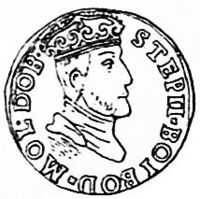
Stefan Razvan
Encyclopedia

Romania
Romania is a country located at the crossroads of Central and Southeastern Europe, on the Lower Danube, within and outside the Carpathian arch, bordering on the Black Sea...
n state of Wallachia
Wallachia
Wallachia or Walachia is a historical and geographical region of Romania. It is situated north of the Danube and south of the Southern Carpathians...
, who became the Voivode (Prince) of Moldavia
Moldavia
Moldavia is a geographic and historical region and former principality in Eastern Europe, corresponding to the territory between the Eastern Carpathians and the Dniester river...
(between 24 April 1595 and August 1595).
Biography
The father of Ştefan Răzvan was a MuslimMuslim
A Muslim, also spelled Moslem, is an adherent of Islam, a monotheistic, Abrahamic religion based on the Quran, which Muslims consider the verbatim word of God as revealed to prophet Muhammad. "Muslim" is the Arabic term for "submitter" .Muslims believe that God is one and incomparable...
Rom from the Ottoman Empire
Ottoman Empire
The Ottoman EmpireIt was usually referred to as the "Ottoman Empire", the "Turkish Empire", the "Ottoman Caliphate" or more commonly "Turkey" by its contemporaries...
who emigrated north of Danube
Danube
The Danube is a river in the Central Europe and the Europe's second longest river after the Volga. It is classified as an international waterway....
, in Wallachia, while his mother was a Romanian
Romanians
The Romanians are an ethnic group native to Romania, who speak Romanian; they are the majority inhabitants of Romania....
peasant from the new country of settlement. At that time, all the Romani people living in the Romanian states of Wallachia and Moldavia were slaves. The rule was applied also to any Romani immigrants, excepting the Ottoman citizens. Benefiting of this exception, the father and later the son could remain free and become an active part in the local society.
Ştefan Răzvan appears as a political player at the beginning of Michael the Brave's rule in Wallachia (1593–1601), as a close noble ally of the Wallachian Prince. He previously converted from Islam
Islam
Islam . The most common are and . : Arabic pronunciation varies regionally. The first vowel ranges from ~~. The second vowel ranges from ~~~...
to Christianity
Christianity
Christianity is a monotheistic religion based on the life and teachings of Jesus as presented in canonical gospels and other New Testament writings...
, attracting the wrath of the Ottomans. He had the boyar
Boyar
A boyar, or bolyar , was a member of the highest rank of the feudal Moscovian, Kievan Rus'ian, Bulgarian, Wallachian, and Moldavian aristocracies, second only to the ruling princes , from the 10th century through the 17th century....
social status and he was a cultured person. Later he becomes involved in the politics of the neighbouring Romanian country of Moldavia, where he was appointed as part of the Princiary council, with the title of hatman (second in rank in the army after the Prince), during the reign of Aron Tiranul
Aron Tiranul
Aaron the Tyrant , sometimes credited as Aron Emanoil or Emanuel Aaron , was twice Moldavian Voivode : between September 1591 and June 1592, and October 24, 1592 to May 3, 1595. He was Alexandru Lăpuşneanu's son....
(Aaron the Tyrant). He led the campaigns of the Moldavian army against Tighina (Bender)
Bender, Moldova
Bender or Bendery, also known as Tighina is a city within the internationally recognized borders of Moldova under de facto control of the unrecognized Transnistria Republic since 1992...
, Chilia
Chilia
Chilia may refer to:* Kiliya, Ukraine* Chilia, a village in Bârgăuani Commune, Neamţ County, Romania* Chilia, a village in Făgeţelu Commune, Olt County, Romania* Chilia, a village in Homoroade Commune, Satu Mare County, Romania...
, Cetatea Albă and Northern Dobruja
Dobruja
Dobruja is a historical region shared by Bulgaria and Romania, located between the lower Danube river and the Black Sea, including the Danube Delta, Romanian coast and the northernmost part of the Bulgarian coast...
, then occupied by the Ottomans. Ştefan became very popular among the soldiers and, with their support and with the help of the Transylvania
Transylvania
Transylvania is a historical region in the central part of Romania. Bounded on the east and south by the Carpathian mountain range, historical Transylvania extended in the west to the Apuseni Mountains; however, the term sometimes encompasses not only Transylvania proper, but also the historical...
n Prince Sigismund Báthory
Sigismund Báthory
Sigismund Báthory was Prince of Transylvania.-Biography:Hailing from the Báthory family's Somlyó branch, he was the son of Christopher Báthory, Voivod of Transylvania, and nephew of Stephen Báthory, King of Poland...
, he ousted Aron Tiranul (whose image was eroded among the population), on 24 April 1595.
His leadership did not last long, because the neighbor political power of the Polish-Lithuanian Commonwealth
Polish-Lithuanian Commonwealth
The Polish–Lithuanian Commonwealth was a dualistic state of Poland and Lithuania ruled by a common monarch. It was the largest and one of the most populous countries of 16th- and 17th‑century Europe with some and a multi-ethnic population of 11 million at its peak in the early 17th century...
did not agree with Ştefan Răzvan's alliance with Transylvania and Wallachia. They invaded Moldavia in August, bringing Ieremia Movilă
Ieremia Movila
Ieremia Movilă was a Hospodar of Moldavia between August 1595 and May 1600, and again between September 1600 and July 10, 1606.-Rule:...
as the Prince accepted by the Poles. The decisive battle was on the Suceava
Suceava
Suceava is the Suceava County seat in Bukovina, Moldavia region, in north-eastern Romania. The city was the capital of the Principality of Moldavia from 1388 to 1565.-History:...
's plains (on 3 December 1595), concluded, after three hours of fight, with the Polish victory. Ştefan ran towards Transylvania, but he was captured and impaled
Impalement
Impalement is the traumatic penetration of an organism by an elongated foreign object such as a stake, pole, or spear, and this usually implies complete perforation of the central mass of the impaled body...
.

